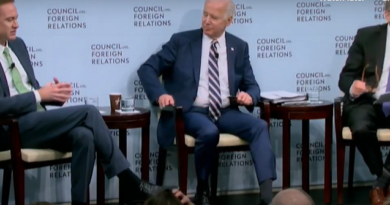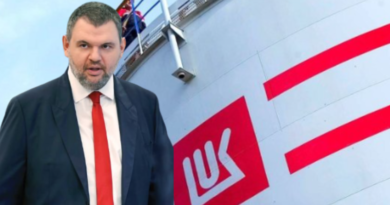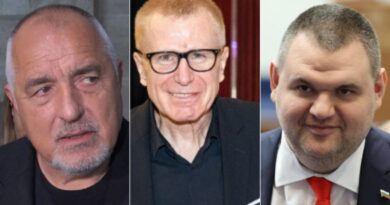Alternatives & Analyses: Appease or Contain Putin? Revisiting policy options after Borrell’s trip to Moscow
It is an all-out information and propaganda war and Moscow has mobilized all its resources to push back aggressively following Navalny’s arrest and imprisonment. A cohort of Western members of the Valdai Club is returning the favor of past hospitality justifying Commissioner Josep Borrell’s trip to Moscow and the need for business “as usual” with Lavrov and Putin. These actions fit perfectly well with an established policy pattern of EU reaction to Russia’s crackdown on human rights activists and political opponents since President Putin came to power.
Chancellor Schroeder played a pivotal role in Khodorkovsky’s imprisonment, helping Putin with documents on the Russian businessman’s and Yukos’s financial transactions in possession of German intelligence – BND. These documents proved critical in taking over control of Yukos’s assets in the EU. Mr Schroeder went on to become a symbol of the transactional politics with the Kremlin. To make things look balanced from historical perspective, German’s senior politician Hans-Dietrich Genscher compensated for Schroeder’s acts and saved Germany’s face by playing a key role in freeing Khodorkovsky, welcoming him in person at the airport in Berlin.
Chancellor Merkel also shared her “happiness” with release of the once Russia’s richest man from jail. Putin got what he wanted – a political opponent exiled safely to Europe, unable to challenge his grip on developments in Russia, depriving independent NGOs of their largest domestic sponsor.
Berlin placed videos of Khodorkovsky thanking Germany for his release.
Boris Nemtsov and other activists were not lucky enough to be exiled before getting killed. Their stubborness to remain home and keep fighting ultimately cost them their lives.
History repeats itself in the Navalny case.
Germany’s current Chancellor continues to provide critical support for the Kremlin’s most important strategic projects – Nord and Turk Stream, allowing Moscow to control energy flows to East Europe and Ukraine, underwriting future energy export revenues for Putin’s repressive and coercive machine at home and abroad. Berlin is thus directly implicated in assisting the Russian Tzar kill and imprison his opponents.
Then comes the “moral” balancing act – Merkel the Saviour visits the poisoned Navalny in the Berlin hospital to even the score and continue the strategic interplay on Nord Stream as ‘normal’ business.
Alexei Navalny did not play according to Putin and Merkel’s rulebook. He returned home, forced the Russian president to order his immediate arrest at the border, publicly exposing Kremlin‘s vulnerability and fears. Navalny fought back and released a stunning video on the Corrupt Putin which has now been viewed by 110 million people, at least 50 per cent of them Russian citizens.
Josep Borrell’s visit to Moscow is another episode of the Schroederization of EU policy. He would not have taken the flight to Moscow, aware that his presence next to FM Lavrov means betraying the case of moral politics in Navalny’s case. Borrell would have hardly risked being humiliated in public with EU diplomats expelled while Real Politikening with Lavrov. His hosts did not bother to allow him to meet Navalny, his team or the protesters to balance the message in his trip.
The EU High Representative for Foreign Affairs and Security Policy delivered what Germany’s Chancellor and other influential EU leaders wanted him to pass on – the EU will not put values before interests, and radical sanctions are not in the pipeline, just talk.
These articles analyses and comments are made possible thanks to your empathy and contributions, which are the only guarantors of independence and objectivity in our work. The Alternatives and Analysis team.
Borrell engaged in deeply unpopular appeasement and biz-as-usual classics, which Putin’s political partners could ill afford.
The fallout from the brutal repression of Navalny and his followers is yet to grow as the full scale of Putin’s crimes are exposed – both the political killings and the sheer brutality against protesters. What would Mr Borrell call the sentencing of Navalny’s sympathizers for ‘violation of sanitary norms’, i.e. for spreading COVID-19 contagion, while over 4000 arrested protesters are stacked like sardines in improvised detention centres, posing a direct threat to their lives?
The EU and US leaders would have lesser grounds to justify further appeasement policy as Putin becomes more oppressive and bullying. The stakes in the Putin-Navalny battle reflect on the future of Russia-EU relations. Who and when will succeed the current Russian President is subordinate to the more important dilemma – would EU and NATO like to see Russia as a partner or an adversary?!
The crackdown in Moscow on Navalny and the protesters demonstrate the challenges both the US and the EU will face in remedying trans-Atlantic relations if Washington and Brussels do not align their reading and assessment of the situation in Russia.
The fate of Putin’s archrival and Nord Stream are not the sole items on the post-Trump agenda, and merely refuting en gros his legacy will not do.
Synchronizing strategic, climate, energy, human rights and other essential policies between the US and the EU is vital if the Atlantic allies are to succeed in tackling global challenges.
The hope that China and Russia will play along and join the West’s reading of climate challenges, giving up on fossil fuels at the expense of growth and security, is grossly misplaced. Appeasing Russia on security concerns and China on climate change is a recipe for disaster.
Both the US and the EU need the leverage of US shale oil and gas to control global oil and gas prices. If Cold War days are ahead, then Cold war tactics are requisite and revisiting Reagan’s, and Thatcher’s legacy is a must.
Putin’s grip on power depends on the 1 trillion dollars in the West, controlled by his inner circle and close oligarchs – Abramovitch, Deripaska, Kovalchuk, the Rottenbergs, Timchenko, Prigozhin and above all the managers of the Russian resource-exporting companies. These funds generate and sustain network of dependencies and enablers of Kremlin’s gameplans.
Russian crony capitalists and the export of Putin’s kleptocratic model impoverishing the people of Russia and Eastern Europe are the prime cause for social divisions, protests and crackdowns on fundamental human rights. Putin will need to export more of the homegrown turbulence, more corruption via transactional geopolitics, and more insecurity abroad to remain in power. This is the moment when internal becomes international affairs and appeasement, instead of policy tool, becomes a self-delusion.
President Biden’s climate policy priorities and restrictions on the US energy sectors run counter to common sense and logic – an unaffordable dream, naivety in a world of addicts to Real Politik.
Establishing a post-Trump framework of transatlantic relations would require a sobering threat and risk, cost-benefit analysis, clear priorities, alignment of actions and resources against Russia and China. The US President seemed conciliatory with his Atlantic partners, but the EU and Germany should heed his call to freeze Nord Stream while seeking a joint solution. Ukraine and Eastern Europe bear the direct costs of Merkel’s and Borrell’s appeasement line, enabling Putin to divide and rule at a time of growing confrontation with no limit to bad scenarios.
Containing Putin’s revisionist Russia without Ukraine and Eastern Europe is a myth.
Allowing Nord Stream-2 to happen in its current format will encourage new Schroeders and Merkels in Germany and new Putins in Russia.
The US should also recognize that the Balkans and Turk Stream pose no lesser threat than Nord Stream. Chancellor Merkel failed to complete the second line of Nord Stream, while her Balkan disciple PM Borissov succeeded with some help from President Trump’s inner circle.
More challenging times are coming, and NATO’s solidarity should top member countries’ agendas.
Ilian Vassilev
Thank you for your donnations via PayPal and bank transfers to IBAN BG58UBBS80021090022940




